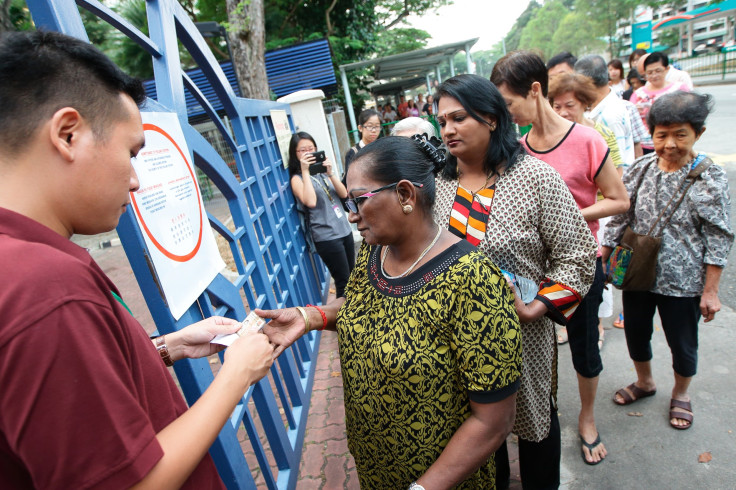Singapore Votes In Hotly Contested Poll, Though Ruling Party Bound To Win

SINGAPORE (Reuters) - Singapore voted in its most hotly contested general election on Friday, a test of the long-ruling People's Action Party's (PAP) dominance of politics in the rich, clean and green city state, even though it is bound to win.
Years of strong growth have turned the island nation into an international financial hub with spotless streets and malls, well-tended parks and living standards unmatched in Southeast Asia.
But that success and an influx of foreign workers have brought high property prices, crowded public transport, and a widening wealth gap which have fueled resentment among many in a city that surveys rank as one of the world's most expensive.
Opposition parties are hoping to take advantage of the grumbling and are contesting all 89 seats in parliament for the first time since independence in 1965.
Voting is compulsory for almost 2.5 million eligible voters.
The opposition has focused its campaign on the bread-and-butter issues of jobs, healthcare and housing. Preliminary results are expected from a couple of hours after the polls close at 8 p.m. (1200 GMT).
"I want to see more opposition members in parliament from more parties," said one voter, a lawyer in his 40s who gave his family as Tan. "I hope there are enough opposition members to fill the front benches because we can then have shadow ministers to effectively suggest alternative policies."
Voting began amid seasonal "haze" caused by forest fires in neighboring Indonesia, but the air quality index was down from "very unhealthy" levels on Thursday night.
Prime Minister Lee Hsien Loong, who cast his vote in a constituency in the south of the city with his wife,Ho Ching, said he was confident.
"We've done our best," Lee told reporters. "It's a major turning point for Singapore."
The PAP, which has ruled since independence, has a bedrock of support and will win the bulk of parliament's seats but opposition inroads would challenge its dominance.
"In this election, we are showing a report card, we are proud of it," Lee told his last rally late on Wednesday.
The PAP's share of the vote dropped to 60.1 percent in the last election, in 2011, its lowest ever. Nevertheless, it held 79 of a total 87 seats in the outgoing parliament.
The main opposition Workers' Party held seven seats while one, that of former Prime Minister Lee Kuan Yew, the current prime minister's father who died in March, was vacant.
The PAP is hoping that a sense of patriotism inspired by this year's 50th anniversary and respect for the elder Lee will work in its favor. The elder Lee drew praise for his market-friendly policies, but also criticism at home and abroad for his strict controls over the press, public protest and political opponents.
Since 2011, Prime Minister Lee has launched a multi-billion-dollar healthcare insurance program for the elderly, introduced cooling measures for the property market and curbed the flow of foreign workers.
But the election comes as economic risks are in focus due to uncertainties stemming from China's economic slowdown and wobbly markets. DBS Bank, Singapore's biggest lender, this week cut its economic growth forecast for Singapore to 1.8 percent, below the official forecast of 2-2.5 percent.
© Copyright Thomson Reuters 2024. All rights reserved.











